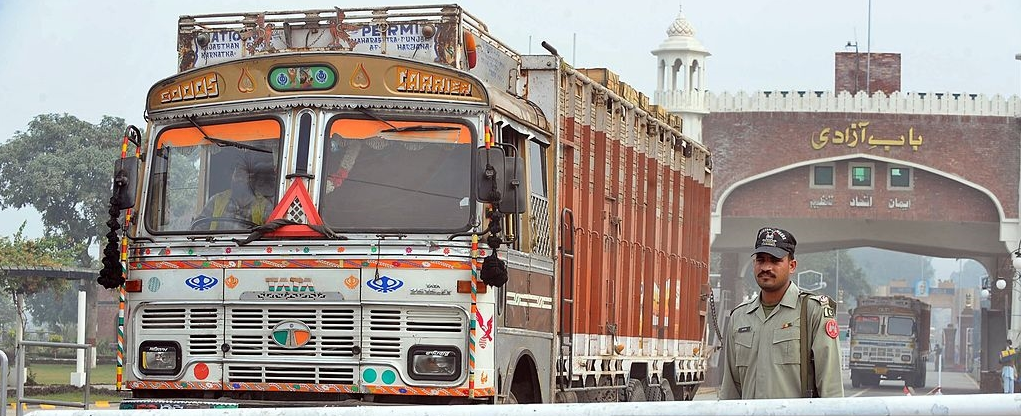
Over the past decade and a half, relations between India and Pakistan have faced multiple challenges, including the Kargil Conflict, tensions in the aftermath of the Mumbai attacks of 26/11, and numerous skirmishes across the Line of Control (LoC). Yet there have been a number of confidence-building measures (CBMs) such as the Delhi-Lahore bus, the Amritsar-Nankana Sahib bus service, the Munabao-Khokhrapar train service, and the Srinagar-Muzzafarabad bus service which have persisted even during times of tension and played their part in giving a fillip to people-to-people contact and interactions between people from different walks of life and strata of society. Many of these links, such as the Munabao-Khokhrapar rail service, had existed before the 1965 war, but were disrupted.
In addition to these efforts, there has been a reasonable rise in trade through the Wagah-Attari land route with trade between both countries crossing $2 billion as of 2014. The number of goods being traded through the land route too has gone up to 137 – though there is scope for increasing this.
There has also been demand for opening up of other trade routes through Punjab, as well as in Munabao-Khokhrapar (Rajasthan-Sind) and Gujarat-Sindh. The credit for all the above steps goes not just to central governments, but a number of other actors such as state governments (border regions), members of civil society, chambers of commerce, academics, and journalists. This multi-layered diplomacy has ensured that even during times of tension, links between both sides are not totally broken, and has also widened the constituency for a more manageable relationship. This constituency does not consist merely of utopian peaceniks, but also businessmen and realists on both sides.
India and Pakistan are currently led by two prime ministers who are pro-business – in fact there have been reports that Indian industrialists are keen to sell energy via the Gujarat border to Pakistan. It is important that they both exhibit pragmatism and ensure that basic interactions are not disturbed by jingoistic narratives that can dominate the bilateral discourse. The invitation of Pakistani PM Nawaz Sharif to Indian PM Narendra Modi’s swearing-in ceremony and the talks held between the two leaders were some indications of breakthrough in matters of trade. But subsequent exchanges of fire at the LoC in Kashmir and on the International Border have hardened attitudes on both sides. Bilateral talks scheduled between the Foreign Secretaries were called off in August, but the two leaders met briefly on the last day of the SAARC Summit in Kathmandu in November 2014. The Indian PM also called his Pakistani counterpart in the aftermath of the dastardly Peshawar attack in December. PM Modi later sent birthday wishes to PM Sharif on his birthday, December 25th.
While there are a number of vexing issues which need to be addressed, it is important that the leadership ensures that links between citizens of both countries are not broken. While it is true that people-to-people efforts may have not resulted in any tangible results so far, the termination of such links will not help either – it will only lead to a further hardening of identities. Some of the steps which leadership on both sides should take in this context are ensuring that the bus and train services remain intact, the possibilities of opening up alternative trade routes are seriously explored, and interactions at the sub-national level are encouraged. PM Modi has given clear indicators about his thrust on improving ties with SAARC countries via the expansion of trade and increases in connectivity. During the SAARC Summit held in November 2014, he mentioned that goods traded between the Punjab’s currently take a circuitous route via Dubai and Singapore.
The creation and implementation of CBMs is a difficult task, aggravated by the way that the activities are regularly subject to outside political strain’s preventing their advancement. Achievement often relies on the efforts of national leadership, who perceive the gains of CBMs and work overwhelmingly to seek better solutions regardless of criticism or fear. The requirement for sustained engagement to address issues of regional security is similarly critical. While it is true that CBMs may not guarantee the resolution of disputes they can help – not just in keeping dialogue open between individuals on both sides, but also also tempering jingoistic sentiment on both sides.
Tridivesh Singh Maini is Associated with The Jindal School of International Affairs, Sonepat.
Haroon Janjua is an Islamabad-based freelance columnist who writes on South Asian geo-political issues. Tweets: @JanjuaHaroon
***
Image: Arif Ali-AFP, Getty